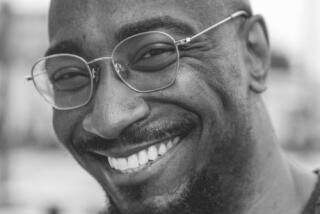Book review: ‘Lights Out in Wonderland’ by DBC Pierre
LIGHTS OUT IN WONDERLAND
A Novel
DBC Pierre
W.W. Norton: 352 pp., $25.95
Let’s be clear from the outset: Gabriel Brockwell is an unlikely suicide. The narrator of DBC Pierre’s third novel, “Lights Out in Wonderland,” is uproarious, dissolute, disrespectful, but he lacks the suicide’s inward-turning anger, the yearning to erase oneself. I mention this because Gabriel would like us to believe otherwise; as he observes in the book’s opening lines, “There’s no name for my situation. Firstly because I decided to kill myself. And then because of this idea: … I don’t have to do it immediately.”
And yet there’s a catch, this matter of not doing it immediately, suggesting that there’s more at work than even Gabriel imagines, an attachment to the world. What’s suicidewithout urgency, without a quivering itch to die? No, Pierre wants us to understand, Gabriel is too wrapped up in himself, too consumed with his plans and pleasures, to want to leave his life so freely. Why kill yourself when you have so much havoc to create?
Havoc is what Gabriel is after, first in an aborted rehab stint in London, then in Tokyo, where he destroys a friend’s restaurant career, and finally in Berlin, a city that “has nothing to learn from anyone.” Just 26, with an abiding love of drugs and drink, he is a self-proclaimed bacchanalian, who sees his decadence as a reflection of society’s own.
“To take hold,” he explains in an aside that speaks directly to our current moment, “a decadence relies on communal thoughtlessness, and this is first brought about by language. …Vocabulary shrinks, forcing more concepts to live behind fewer expressions; and in the process the acceptable and unacceptable come to mix, and are passed off one for the other.” That’s a vivid evocation of a world in which “God’s gone, replaced by the markets. Now they’re going. We don’t know who we are anymore because there’s no we.”
Pierre has long written from such a perspective; his first novel, the Man Booker Prize-winning “Vernon God Little,” revolved around a teenager implicated in a school shooting; his second, “Ludmila’s Broken English,” unfolds in the shifting landscape of the post-Cold War world. Together with “Lights Out in Wonderland,” they constitute what’s been called the “End Times Trilogy,” although the connections among the books are loose, based on theme instead of character.
Similarities aside, however, “Lights Out in Wonderland” stands emphatically on its own. If Gabriel is reminiscent of anyone, it’s Ignatius J. Reilly, the picaresque antihero of John Kennedy Toole’s “A Confederacy of Dunces,” or Eddie Coffin, the philosopher-turned-bank robber at the center of Tibor Fischer’s “The Thought Gang.” Like them, he is an outsider who not so much reflects the world as he remakes it, spinning with such absurdist force that he transforms the lives of anyone who draws close to his gravitational field. And like themhe is a bit of a bumbler — or not a bumbler exactly but more of a holy fool.
There are whispers of this in the first two sections of the novel — especially an extended set piece in a Tokyo restaurant that spirals hilariously out of control — but it becomes most apparent once “Lights Out in Wonderland” moves to Berlin. To atone for his Tokyo transgressions, which have left his best friend imprisoned, Gabriel must work the deal of a lifetime, turning the soon-to-be-shuttered husk of Tempelhof Airport, a sprawling holdover from the Nazis, into the site of a banquet that’s excessive even by his terms. Setting it up, he visits a variety of demimondes, culminating in a drug-fueled evening on the site of the old Gestapo headquarters, a derelict block of ruins where he has an unlikely revelation: “Divinity is achieved through the senses — whether you abstain from sensing or indulge in it, life exists in relation to how deeply we sense.”
Here we see the fundamental paradox of the novel, the tension between sensation and oblivion and the promise that only by immersing ourselves in the world is there any chance we may be redeemed. That this is fleeting, futile, is part of the equation; it is in the effort that we find meaning rather than the result.
To make the point explicit, Pierre tells the story of a rich man, en route to Monaco “with a model next to him in a sports car, on their way to meet an even more beautiful model,” who suddenly stops the car and walks away. The logic? “He discovered,” Pierre writes, “the power band of pleasure lies in the moment before. … It means that your best moment isn’t with the twentieth beer, but with the first beer in front of you. It’s not on your hundred millionth dollar, but on your nine hundred and ninety-ninth. It means that human pleasure comes from opening a door, not from walking through it.” In other words: “It doesn’t get any better than this.”
On the one hand, that’s a throwaway, a riff on indulgence and its discontents. But more important, it suggests that everything contains its opposite, that existence is a balancing act. “I’ve seen self-destruction before,” a woman named Anna observes. “Berlin has seen it too. Coming from England you probably find us all so meek and quiet, you think we never tasted decadence. But did you ever ask why we might be this way? Because we tasted decadence like you’ve never tasted it. We tasted it so much that in the end Hitler seemed a welcome relief.”
The implication is terrifying: that excess leads to excess, freedom to repression to freedom and so on in an endless loop the loop. Still, Pierre finds a whisper of redemption, if only in Gabriel’s ability to persevere. Among the triumphs of the novel is that it lets us know more about the character than he knows about himself, revealing his frantic machinations not as those of a man intent on dying but of one who wants to live.
“Do you really think someone so intent on killing themselves would still be dragging through such an agonizing charade?” Gottfried, a former Stasi agent, asks him at the point when he can no longer deceive himself. “You describe it as a limbo — well, let me tell you something: what you’ve snagged on here is simply adulthood — the most terrifying limbo of all.”
More to Read
Sign up for our Book Club newsletter
Get the latest news, events and more from the Los Angeles Times Book Club, and help us get L.A. reading and talking.
You may occasionally receive promotional content from the Los Angeles Times.







